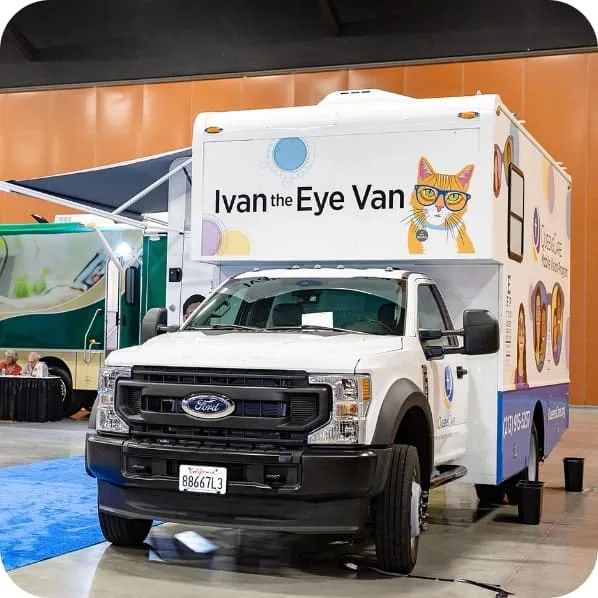Mobile Healthcare Vehicles Guide

Although some mobile health clinics operate without wheels, most are housed in moving vehicles. Here you will learn the basics about:
1. Types of Vehicles
2. Pre-Owned Vehicles
3. Financing
4. Fuel
5. Insurance
An Introduction to Mobile Clinic Vehicles
1. Mobile Clinic Vehicle Options
The majority of mobile health clinics use one of six base-unit vehicle types, a choice typically driven by a combination of factors, including budget, care-delivery model, geography, and design needs.
Class A Motorhome or Coach
Gross vehicle rate weighting (GVRW): Up to 55,000 pounds
These vehicles are positioned at the top of the medical vehicle spectrum as far as interior space, flexibility, comfort, and amenities are concerned. Between 36- and 44-feet long, each starts as a rolling chassis with a power train, axles, a steering column, and hook-ups for the dashboard. The medical vehicle manufacturer then adds the entire coach body from bumper to bumper. Class A coaches may come with four to six axles and up to four slide-outs.
Class B Motorhome or Van
GVWR: Up to 12,000 pounds
These vehicles are typically full-size Ford, GM, or Mercedes vans into which medical interiors and hardware are then installed. Class B vans are easy to drive and park, are readily serviced by most dealerships, and often achieve significantly better fuel economy than Class A vehicles. Some feature extended fiberglass tops to create more interior space and headroom.
Class C Motorhome
GVWR: Up to 15,000 pounds
Class C motorhomes start as cab and chassis units to which the medical body is added. The cabs themselves may be made by Chevrolet, Ford, or Mercedes, or maybe a full-size pickup or medium-duty commercial truck such as Freightliner, GM, or Sterling International. The latest versions of these vehicles may be as long as 40 feet, with two slide-outs.
Travel Trailer
GVWR: Up to 10,000 pounds
These trailer-style units are single-level and come with as many as three axles. They require tow vehicles, can house slide-outs, and can be as long as 40 feet. Travel trailers fall into two categories: those below 4,000 pounds and those greater than 4,000 pounds
Tractor with Fifth Wheel and Trailer
GVWR: Up to 15,000 pounds
While these fifth-wheel trailers with a tow vehicle — mainly heavy-duty pick-ups — have become very popular in the recreational market, they are not widely used for medical purposes in part due to the high floor level.
Tractor with Fifth Wheel and Medical Trailer
These specialized medical vehicles require a commercial tractor such as Kenworth, Volvo, Mack, or Freightliner as the motive power. A commercial driver’s license (CDL in the US or Class 1 in Canada). The trailers, which run up to 53 feet in length, may be designed with multiple slide-outs and allow a wide variety of internal configurations for medical use.
2. Pre-Owned Vehicles
Pre-owned clinical vehicles can be a cost-effective option for new programs or those looking to expand their fleet. But finding such opportunities is difficult, which is why the Mobile Healthcare Association tries to help by matching clinic vehicles in need of a new home with programs in search of a pre-owned vehicle. If you fit either of those categories, please contact us. We also provide information on the Association’s industry partners that sell pre-owned vehicles.
For assistance, contact Executive Director Elizabeth Wallace at (314)764-2288 or ewallace@mobilehca.org.
3. Vehicle Financing
The vehicle is the largest investment before a new mobile health clinic’s launch. Programs rely upon several financing options to get on the road:
– Fundraising events
– Internal organization support (i.e., foundation contributions)
– Community partnerships (public or corporate)
– Grantors (private or government)
– Service contracts (local or national)
– Commercial financing (vehicle equipment package)
For more information or to connect with members who have experience financing a vehicle, contact Executive Director Elizabeth Wallace at (314)764-2288 or ewallace@mobilehca.org.
4. Vehicle And Generator Fuel
Organizations must decide which type of fuel will power their clinic’s vehicle engine and onboard generator. Choices include gas, diesel, propane, liquid natural gas, hybrid, and electric.
Major Considerations and Implications
Emissions: Fumes from whatever fuels the generator must not enter the care area. This could lead to bad smells and, more seriously, carbon monoxide.
Size of the clinic: Smaller vehicles are typically fueled by regular gas or similar alternative fuels, while larger ones, such as tractor-trailers, are most often diesel-powered. This choice also impacts which type of driver’s license is necessary.
Distances: If the clinic only takes short trips, it will likely be fine with a gasoline generator and motor power. However, those traveling over undulating, hilly terrain or on long trips across a state or province may need to consider diesel for fuel efficiency and greater torque.
Fuel consumption: Commercial diesel engines are more fuel efficient than similar-sized gas engines, although the gap is narrowing.
Price: Diesel vehicles are often more expensive to purchase initially but are thought to be built to more robust standards and have the greater fuel economy. Generally, diesel gas costs slightly more.
5. Mobile Clinic Insurance
Mobile healthcare programs generally require a commercial vehicle liability policy for any vehicular clinics. One of our industry partners, Thum Insurance Agency, is available to assist members* in securing this policy or any of the following:
– Commercial General Liability
– Commercial Inland Marine
– Commercial Property
– Commercial Umbrella
– Cyber Liability
– Directors and Officers’ Liability
– Employment Practices Liability
– Equipment Breakdown
– Professional Liability/Errors & Omissions
– Workers Compensation & Employers Liability